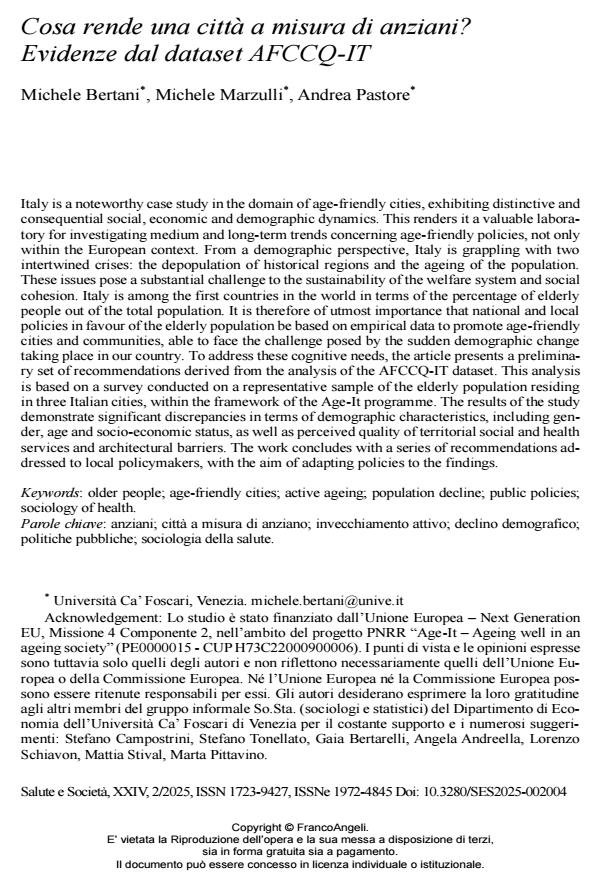Cosa rende una città a misura di anziani? Evidenze dal dataset AFCCQ-IT
Journal title SALUTE E SOCIETÀ
Author/s Michele Bertani, Michele Marzulli, Andrea Pastore
Publishing Year 2025 Issue 2025/2
Language Italian Pages 13 P. 36-48 File size 396 KB
DOI 10.3280/SES2025-002004
DOI is like a bar code for intellectual property: to have more infomation
click here
Below, you can see the article first page
If you want to buy this article in PDF format, you can do it, following the instructions to buy download credits

FrancoAngeli is member of Publishers International Linking Association, Inc (PILA), a not-for-profit association which run the CrossRef service enabling links to and from online scholarly content.
Italy is a noteworthy case study in the domain of age-friendly cities, exhibiting distinctive and consequential social, economic and demographic dynamics. This renders it a valuable labora-tory for investigating medium and long-term trends concerning age-friendly policies, not only within the European context. From a demographic perspective, Italy is grappling with two intertwined crises: the depopulation of historical regions and the ageing of the population. These issues pose a substantial challenge to the sustainability of the welfare system and social cohesion. Italy is among the first countries in the world in terms of the percentage of elderly people out of the total population. It is therefore of utmost importance that national and local policies in favour of the elderly population be based on empirical data to promote age-friendly cities and communities, able to face the challenge posed by the sudden demographic change taking place in our country. To address these cognitive needs, the article presents a prelimina-ry set of recommendations derived from the analysis of the AFCCQ-IT dataset. This analysis is based on a survey conducted on a representative sample of the elderly population residing in three Italian cities, within the framework of the Age-It programme. The results of the study demonstrate significant discrepancies in terms of demographic characteristics, including gen-der, age and socio-economic status, as well as perceived quality of territorial social and health services and architectural barriers. The work concludes with a series of recommendations addressed to local policymakers, with the aim of adapting policies to the findings.
Keywords: older people; age-friendly cities; active ageing; population decline; public policies; sociology of health.
Michele Bertani, Michele Marzulli, Andrea Pastore, Cosa rende una città a misura di anziani? Evidenze dal dataset AFCCQ-IT in "SALUTE E SOCIETÀ" 2/2025, pp 36-48, DOI: 10.3280/SES2025-002004